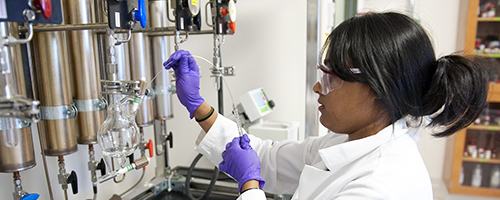Document Type
Article
Publication Date
2-14-2011
Publication Title
Journal of Materials Chemistry
Abstract
We report on the fabrication of covalently crosslinked and amine-reactive hollow microcapsules using 'reactive' layer-by-layer assembly to deposit thin polymer films on sacrificial microparticle templates. Our approach is based on the alternating deposition of layers of a synthetic polyamine and a polymer containing reactive azlactone functionality. Multilayered films composed of branched poly(ethylene imine) (BPEI) and poly(2-vinyl-4,4-dimethylazlactone) (PVDMA) were fabricated layer-by-layer on the surfaces of calcium carbonate and glass microparticle templates. After fabrication, these films contained residual azlactone functionality that was accessible for reaction with amine-containing molecules. Dissolution of the calcium carbonate or glass cores using aqueous ethylenediaminetetraacetic acid (EDTA) or hydrofluoric acid (HF), respectively, led to the formation of hollow polymer microcapsules. These microcapsules were robust enough to encapsulate and retain a model macromolecule (FITC-dextran) and were stable for at least 22 hours in high ionic strength environments, in low and high pH solutions, and in several common organic solvents. Significant differences in the behaviors of capsules fabricated on CaCO3 and glass cores were observed and characterized using scanning electron microscopy (SEM) and energy dispersive X-ray spectroscopy (EDS). Whereas capsules fabricated on CaCO3 templates collapsed upon drying, capsules fabricated on glass templates remained rigid and spherical. Characterization using EDS suggested that this latter behavior results, at least in part, from the presence of insoluble metal fluoride salts that are trapped or precipitated on or within the walls of capsules after etching the glass cores using HF. Our results demonstrate that the assembly of BPEI/PVDMA films on sacrificial templates can be used to fabricate reactive microcapsules of potential use in a wide range of fields, including catalysis, drug and gene delivery, imaging, and biomedical research.
Volume
21
Issue
6
First Page
1736
Last Page
1745
DOI
10.1039/c0jm02633f
ISSN
09599428
Version
Author's Accepted Manuscript
Recommended Citation
Saurer, Eric M.; Flessner, Ryan M.; Buck, Maren E.; and Lynn, David M., "Fabrication of Covalently Crosslinked and Amine-Reactive Microcapsules by Reactive Layer-by-Layer Assembly of Azlactone-Containing Polymer Multilayers on Sacrificial Microparticle templates" (2011). Chemistry: Faculty Publications, Smith College, Northampton, MA.
https://scholarworks.smith.edu/chm_facpubs/29


